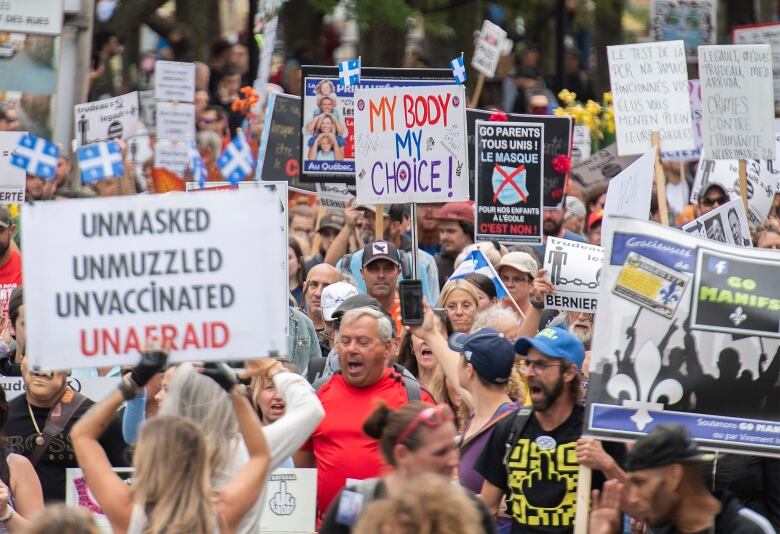A tax on the unvaxxed would be legally and ethically questionable even if it worked
Bioethics expert says it's unwise to base pandemic policy on the resentment and anger of the vaccinated

The pandemic is now in its 23rd month and a highly contagious new variant is running rampant. Safe and effective vaccines are readily available and unvaccinated citizens are contributing disproportionately to a medical crisis that makes life harder and more dangerous for everyone.
So there are surely some perhaps many among the vaccinated who would like to see the unvaccinated suffer significant consequences for their intransigence, up to and including financial penalties. Ideally, such consequences also would minimize the number of people who remain unwilling to get the shot.
But however much Quebec's threat of a tax on the unvaccinated might appeal to feelings offrustration and desperation, it doesn't necessarily follow that Premier Franois Legault's proposal is the rightway to go about confronting the problem.
Though thedetails have not beenfinalized, it does not seem that what Legault is proposing would run afoul of a strict reading of the Canada Health Act. That federal law which Ottawa can enforce by withholding funding for health carefrom individual provinces and territories specifies the principles of universalityand accessibility. But Legault is not proposing a direct fee for necessary medical services.
Whether an annual tax on the unvaccinated undermines the idea of universal medicare is more ofa philosophical or political question. Some might say it does.
But there are other big legal and ethical questionsto ask about such a policy.
'Do they need to do this?'
"The [Charter of Rights] argument that will be made is that basically, [you're] doing something coercive," said Lorian Hardcastle, a law professor at the University of Calgary.
"We probably will see people argue that [Quebec's proposal] violates the [charter] rights to life, liberty and security of the person. And there are cases that talk about [how] part of that right to life, liberty and security of the person is bodily autonomy and making your own medical decisions and the right to self-determination."
Charter rights aren't unlimited. They can be subject to reasonable or minimal impairments. That means it could fall on the Quebec government to justify the infringement.
"I think that this case would really turn on this question of, was the government reasonable in doing this? Do they need to do this? Could they have achieved increased vaccination rates through mechanisms other than this kind of coercive mechanism?" Hardcastle said.
"We don't ordinarily prescribe what health care treatments people must get And so this is quite a jump, and we wouldn't want to make this jump if there wereother stones left unturned."
It's not the same as a 'sin tax'
A court might also want to know how effective the tax is at increasing vaccination rates. Itcould look to examples in Europe for evidence.
It's the degree of coerciveness, Hardcastle said, that separates a tax from other restrictions, such as barring the unvaccinated from accessing non-essential businesses or activities. When it comes to limits on movement, the unvaccinated haveeasy options. If they can't enter a restaurant, they can order delivery.
A number of other current public policiesmight seem loosely analogous to what Legault proposed on Monday charges or regulations targeting unhealthy behaviour that can impose a cost on society.
In Canada, governments already draw much revenue from "sin taxes" on cigarettes, alcohol and gambling. Newfoundland and Labrador will soon have a tax on sugary beverages. There are laws that deal with drunk driving and seatbelts. Carbon taxes are meant to account for harmful environmental impacts.

But again, there are relatively simpleways to avoid those charges: you can choose to not purchase cigarettes or alcohol. The level of coercion involved in demanding that someone be vaccinated is much higher than it is with seatbelt laws andthe courts would be much more protective of medical autonomy,Hardcastle said.
Vardit Ravitsky, a bioethics professor at the University of Montreal, argued that such a tax would raise equity concerns and could place a disproportionate burden on low-income citizens. If such a policy isintroduced, she said, it should imposefees on a sliding scale based on an individual's income.
Singling out the unvaccinated
Ravitsky also saidit shouldbe a measure of last resort,implemented only after every other possible restriction on non-essential activity has been tried.
But otherimplications alsoneed to be considered.Ravitskysaidthat "anything that targets specific groups in the context of health can make it more socially acceptable to target that group further."
"What scares me the most is the idea that has been mentioned [elsewhere] that within the health care system, once patients arrive and they need care, even at that point, they will be prioritized or assessed based on their vaccination status.
"I think that goes against core principles of medical ethics that once people are patients, once they have medical needs, their past is not a part of the evaluation."
WATCH: Prime Minister Justin Trudeau responds to Quebec's pitch for a tax on the unvaccinated
Ravitsky said she's also troubled by the idea thatthe frustration and impatiencethe vaccinated feel toward the unvaccinated could drive government health policy. On Monday, Legault said he understood the "anger" of the vaccinated.
"You don't want the public to think that public health measures are politically chosen to appease the angry, tired majority," she said. "That's not a reason for public health. If you think it's the best one ethically and the most efficient one epidemiologically, fine, but not because the majority is upset. Everybody is upset right now for various reasons."
For all those reasons,taxingthe unvaccinated is not a step that should be taken lightly.
Itremains to be seen whether Legault is prepared to follow through. And the irony is that the threat of such a tax could make its implementation less necessary. More than 7,000 Quebeckers reportedly signed up for their first shot on Tuesday the highest single-day number in recent days.
If that vaccination surge continues, Legault's contribution to the global pandemic campaign might be demonstrating the power of a loudly inflated trial balloon.














_(720p).jpg)


 OFFICIAL HD MUSIC VIDEO.jpg)
.jpg)



























































































